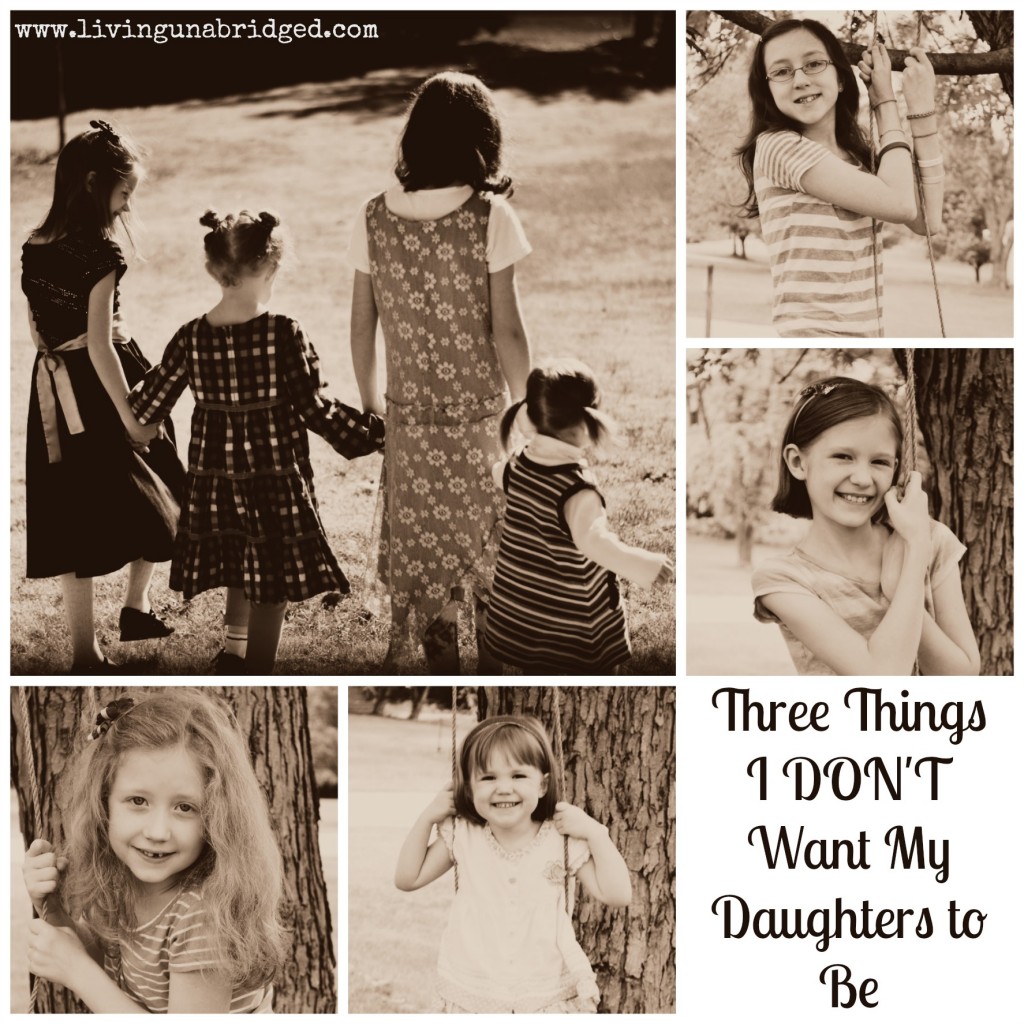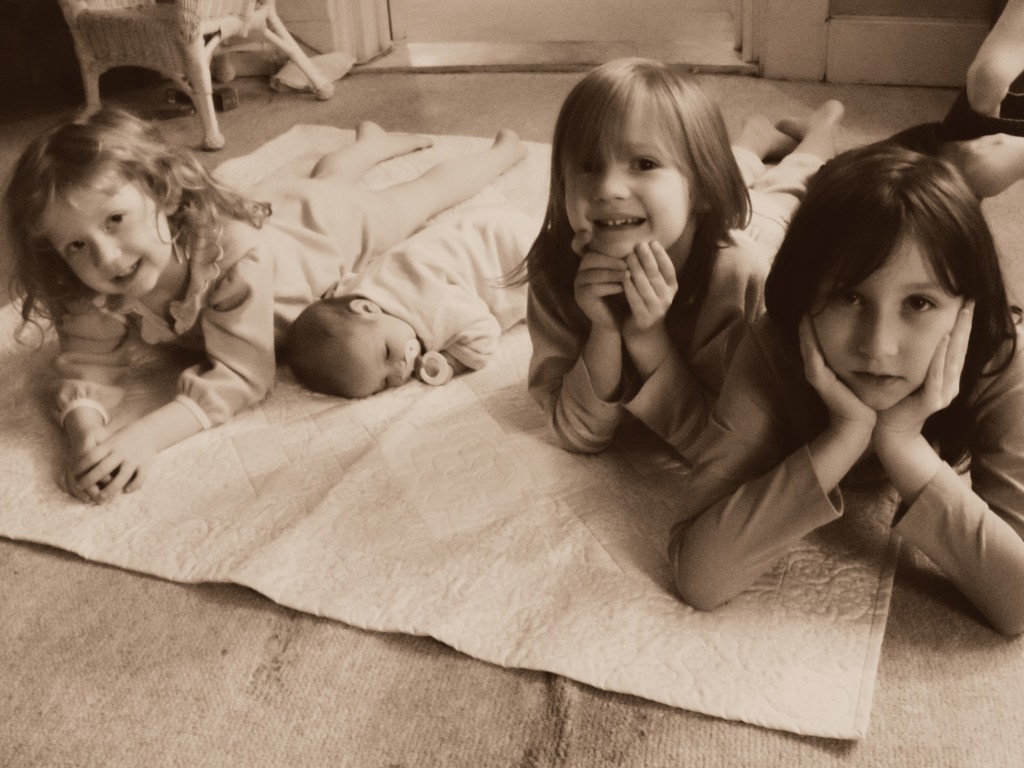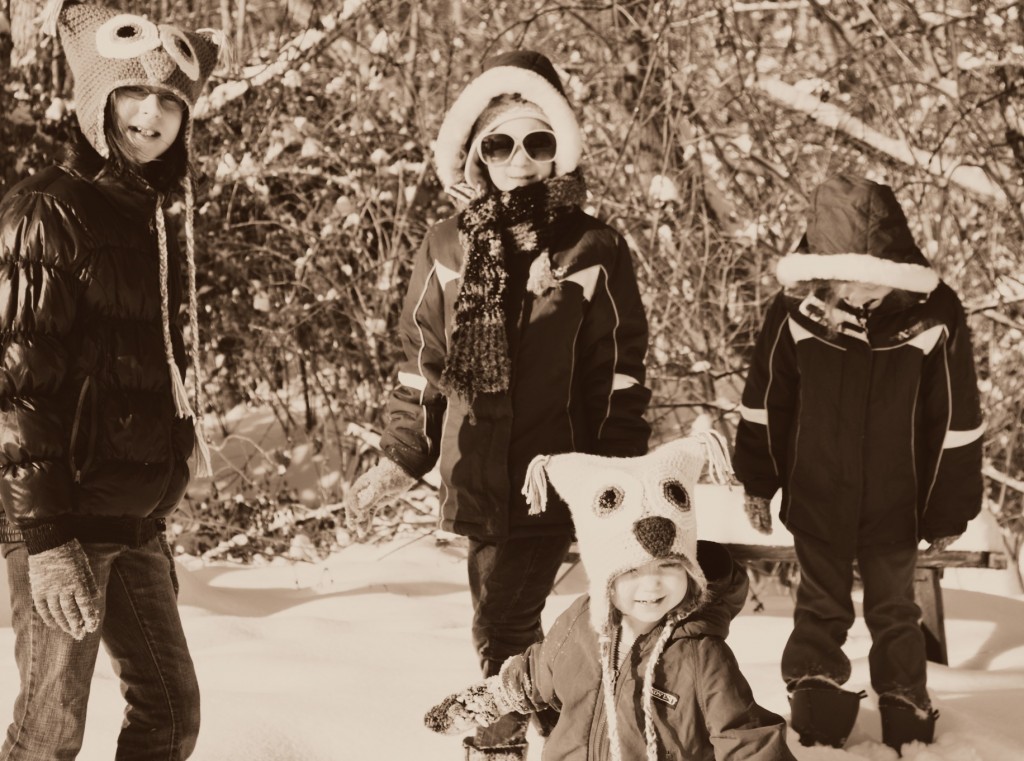We're raising four daughters. Right now they range in age from 13 down to 4. They are beautiful, funny, sweet, intelligent girls (if I do say so myself). We're raising them to dream big dreams and pursue whatever life God has planned for them, whether that's marriage and family, college and career, entrepreneurship or creative pursuits, or some of all of the above.
Most of those decisions are on down the road. But right now, while we're raising them, there are three major things I don't want our girls to be. (Note: I am not trying to leave sons out. I'm sure I'll wish these things for my sons too, but I've had a lot more experience raising girls so far.)

Here are the three things I don't want my daughters to be:
1. Victims of bullying or other types of abuse.
We've all seen the stories: bullying is rampant. "Mean girls" are not just a product of Hollywood imagination, they really exist. Cliques are real. Predators are real. How can we raise our daughters to avoid these dangers?
By teaching them they are in control of their own bodies.
We don't force them to be physically affectionate even with family members or friends. This policy has occasionally caused some tension, as at least one of our daughters is not a hugger and wouldn't hug her great-grandparents when she saw them. That could lead to awkward moments but my husband and I did not force her.
Why? It's her body. If she doesn't feel like hugging, that's her choice, even if she was only four.
Too many parents are teaching their children to ignore their own instincts. If a child has a "weird feeling" about a relative or a person at church or someone they see at school, we need to be sensitive to those feelings. This means not saying, "Oh, honey, I'm sure it's nothing." It means asking more questions, really listening to our children, and really understanding that their feelings and instincts are valid.
Oh and, postscript: our non-hugging daughter eventually became comfortable showing affection in this way to family members she trusts, in her own time.
By fostering a family environment where children can ask any question or tell us anything, even if they think we "won't like it".
This doesn't mean we're raising our children to be disrespectful, just that we're showing that we are trustworthy with their confidences and we will seek out answers if we don't know them.
One way to do this is by apologizing when we're wrong, or when we've made a mistake. Another way is by confessing childhood failures of our own. I don't know about your kids but my kids love to hear about when I was disobedient or made a mess of something.
By teaching them about negative things before someone else does.
Sure, I'd rather not talk to our seven year old about what "sexting" is. But it recently came up because some of our local public schools had a huge incident that made the local news. We talked about this with the older girls and the 7 year old sat in on the conversation.
No, my children do not attend public school. But they do interact with children in the neighborhood and at co-op. They're in youth group at church with kids who go to these exact same schools. They needed to know what it was, and they needed my husband and me to be the ones to explain it.
Other topics that we've addressed: alcohol and drug use, domestic violence, bullying, and pornography. I would much rather not talk about these things. But they exist and my daughters need to hear about them in a safe way.
The same goes for the "sex talk".
News flash: one talk is not enough. We must continually address related issues, whether physical, emotional, or spiritual.
Sometimes we're answering questions ("How did that baby get in there, anyway?") and other times we're just explaining things in a matter of fact way ("No, we don't pull up our shirts. Parts of our bodies covered by swim suits or underwear are not for showing or teasing about.")
By teaching them positive ways to respond to bullying or aggressive behavior.
They might need to clearly state their personal boundaries, an adult may need to be informed, they may need to loudly call for help, they may need to walk away. No one thing is always the right response, but they need to know some of their options.
By teaching them about "unsafe people" instead of what used to be called "stranger danger".
The sad truth is that children who are abused or abducted are rarely victims of a stranger. We have to teach our children what is and is not appropriate behavior between adults and children, even adults we know. (For instance: an adult does not need to ask a child to "help me find my puppy" or to keep a secret from Mom and Dad.)
By loving them. And by telling them we love them and why.
We do also do this by building their self-worth. (Note: I truly believe that self-worth is important. "Self-esteem" is not the same thing and I do not spend a lot of time worrying about whether my children have good self-esteem. But that may be a post for another day.) By praising them, yes, even some of their physical features.
We point out family traits like adorable freckles or dimples. We tell our daughters they are beautiful. Why? Because they are. I don't want them to compare themselves to an impossible, airbrushed standard of beauty.
I wish they could see themselves the way I see them: indescribably precious and beautiful.
It also means not talking about myself in a negative way. I don't call myself "fat", even when I feel like I am. I don't talk about needing to diet. We talk about being healthy, about using cosmetics with a light hand, about braces and glasses being tools to improve difficulties not perfect ourselves, and how we exercise because it's fun, not because we're trying to be supermodels. I don't always do as well as I'd like on these issues but I know how I talk about myself is how my daughters will learn to talk about themselves.

Next on the list of what I don't want our daughters to be:
2. Perpetrators of bullying (or other abuse). How?
By encouraging empathy through personal examples and books or stories.
Your personal stories of being picked on, or a time you regret that you hurt someone else, will help. Reminding your gawky teen that everyone goes through an awkward phase and "this too shall pass" can be illustrated with those family photo albums you have on a shelf somewhere.
By teaching older children to be tender with younger siblings or a family pet.
You may have noticed this, but toddlers are not just naturally gentle. We have to demonstrate that, show them how to pet the kitty nicely, and praise the effort.
By discouraging slapstick humor or mockery.
I know, I know. It's "all in good fun". Maybe I'm more sensitive than most (somehow, I doubt it) but I have never enjoyed movies or TV shows that are all about slapstick humor.
I know: we all laugh when someone slips on the ice or steps on a rake. But should we? How would you feel if you fell in your driveway and the people around laughed at you? Some laughter about physical humor may be OK (and yes, of course, I Love Lucy too), but I think we parents need to be careful here.
It's hard to raise a tender-hearted child when we're also teaching them that other people's suffering is a source of mirth. I'm not OK with that for my kids. Cartoons are one thing, I suppose, but actual human beings have value beyond a punchline.
By modeling gentleness both with our actions and our words.
OK, I admit it: Sarcasm is my native tongue. My husband and I both tend to be sarcastic when we can do so without hurting the other.
But sarcasm doesn't sound as funny when filtered through a nine year old. I can always tell when we need to dial it down a bit, because my children start sounding sarcastic to my ears and I don't like it. Verdict: they're imitating us. Ouch.
I want our home to be a loving, warm place where they feel safe. They need to know I will listen to them without laughing at them or retorting sarcastically. I have to model what I want to hear and see from them.
By teaching them to congratulate other children.
Disappointment is part of life. Sometimes you lose the game. Or you don't earn the highest award. Sometimes you strike out. Losing isn't optional (it's going to happen sooner or later), but how we respond is up to us.
We have to teach our children to say, "Good game," or "Congratulations," or "I hope you really enjoy your gifts," or "Can you teach me how you did that?"
By praising kindness they show to each other.
One daughter hangs up a coat for her sister. One daughter does a chore for a sick sister. Someone gives up the prized spot on the couch without being asked. (WHY does it matter where they sit?!) These are praiseworthy moments. Don't go around with the attitude, "Well, that's what they ought to do anyway."
Exactly. They ought to. And we ought to praise those efforts.
By memorizing Scripture.
Verses about what a true friend acts like, how to respond to adversity, and how we ought to love and forgive each other (every Christian parent needs to have their child memorize Ephesians 4:32 as soon as the child can talk) are powerful reminders of how we ought to treat each other.
Imitate Christ's example, as well as the examples of other heroes of the faith. How did Joseph respond to his brothers? How did David and Jonathan show true friendship?
By teaching them how to ask for forgiveness without justifying their actions.
"I'm sorry I punched you, but you shouldn't have taken my toy," is not a genuine apology. Once again, the best way to teach this is by modeling it.
"I'm sorry I yelled, will you forgive me?" will go further than, "I shouldn't have yelled but you guys should have cleaned up this mess."
We all hurt people whether by actions or words at times and learning how to apologize is an art form few of us have mastered.
Sometimes parents can be so busy trying to prevent others from bullying their child, they fail to see their precious son or daughter has actually become a bully, whether physically or verbally. All children are probably capable of being petty or hurtful. I also know children can learn to treat others with kindness.

Finally I don't want our daughters to be:
3. Passive when they witness others being bullied or hurt.
I think this one may be hardest. We can protect our children from many forms of bullying and abuse. We can correct their bad behavior that we witness, but how do we go the extra step and raise them to stand up for others when they would rather be silent and not call attention to themselves?
By reading stories of courageous people.
I'm a firm believer in the power of literature and history to help us raise strong future adults. They need to know about William Wilberforce and Corrie Ten Boom and Harriet Tubman and Amy Carmichael and Martin Luther King, Jr and George Mueller and Richard Wurmbrand and Eric Liddell and Louis Zamperini and so many more. The heroes of the past inspire the heroes of the future.
No matter what your political or religious views, there is some hero or heroine from days gone by that your children need to meet in a good book.
By encouraging them to stick together.
One thing I love about a larger than average family: they always have someone to play with or confide in or ask for help. We are encouraging them to see our family as a unit, even as we celebrate our differences and individual challenges. The older children should feel a sense of protectiveness to their younger siblings. The loyalty we feel as a family is priceless. (My INTJ self is loving this point. Loyalty is one of the most important character qualities I seek in friends.)
By discouraging shallow friendships.
True friendship is a golden gift, but children are sometimes incapable of seeing when a "friend" is not really demonstrating friendship. True friends don't take advantage of younger children. They don't mock physical differences or weaknesses.
I think the best way to handle these situations is just by asking questions instead of telling your child, "Don't be friends with her." Ask your own child, "How did it feel when she said that?" or "What do you think she should have done there?" Even "How would you have handled that situation?" can help a child evaluate a negative experience. Children are smarter than we give them credit for sometimes.
If you notice an inequality, ask about it rather than decree from your parental wisdom that a child have nothing further to do with that person
(One commonsense exception: your child is in actual physical danger from a fellow teen or child. Then do what needs to be done to remove your child from danger and explain later.)
Shallow friendships lead to passively standing by when someone is being picked on. You don't want to be singled out, so you say nothing.
Strong friendships, where we know our friends have our back, will enable us to stand up for others. Inspiring our children to include others who have been left out may be difficult, but it's a worthy endeavor.
By watching out for "hero worship".
All children look up to and admire some older child or teen. This can be a positive force but it can also be negative. Once again, questions are your best bet. Insulting a child's friend and hero is not the way to win the trust of your child.
By helping chose positive role models.
If you have an admirable family friend who happens to be a teen or young adult that you child might admire, encourage that. Praise the traits you admire in that person, "Susan is such a cheerful helper in the nursery" or "I really admire how Tom took out the trash without his mom asking." Don't overdo it, but your children are witnessing those moments too. And don't forget the important role grandparents (or substitute grandparent figures) play in a child's life.
By participating in service activities.
Helping others who are less fortunate is an experience every child needs. No matter your income level, there's almost always someone that you can help in some way.
By encouraging children to give from their excess, without pride and with gratitude for their blessings.
Toys, games, and clothes can be abundant, so let your child help choose some to pass on to someone else. By the same token, teach your children to accept gifts with humility and pleasure. "I wanted the bigger one," is not an appropriate response to a gift and "I don't need hand me downs" is not what you say when someone offers you their outgrown clothes or toys.
Ultimately, as a Christian, I believe the only way to raise these children of ours to be responsible adults is to cover them in prayer.
Prayers like
- protect them from those who would prey on vulnerability
- help us make wise decisions as we raise them
- allow me to let them learn from their mistakes instead of rushing in to "fix" everything
- make them sensitive to the Holy Spirit's guidance (after all, The Spirit can be with them anywhere even though Mom can't)
- help them grow "wise as serpents, harmless as doves"
- let them see others as God sees them: precious and valuable because they are made in God's image
Sometimes homeschool parents are accused of wanting to shelter their children.
And yes, I guess in one sense: guilty as charged. I'd like to protect my girls from the worst the world can be. But sheltering is not the same thing as hiding our heads in the sand. Sometimes sheltering (or protecting) means arming my children with the best tools I can find. Teaching them about dangers that are out there (in age appropriate ways) and how to respond to those dangers, is not leaving my children unsheltered, it's preparing them for the battle that already exists whether they're aware of it or not.
TL;dr the three things I don't want our daughters to be: victims, bullies, and / or passive. What would you add to the list?








